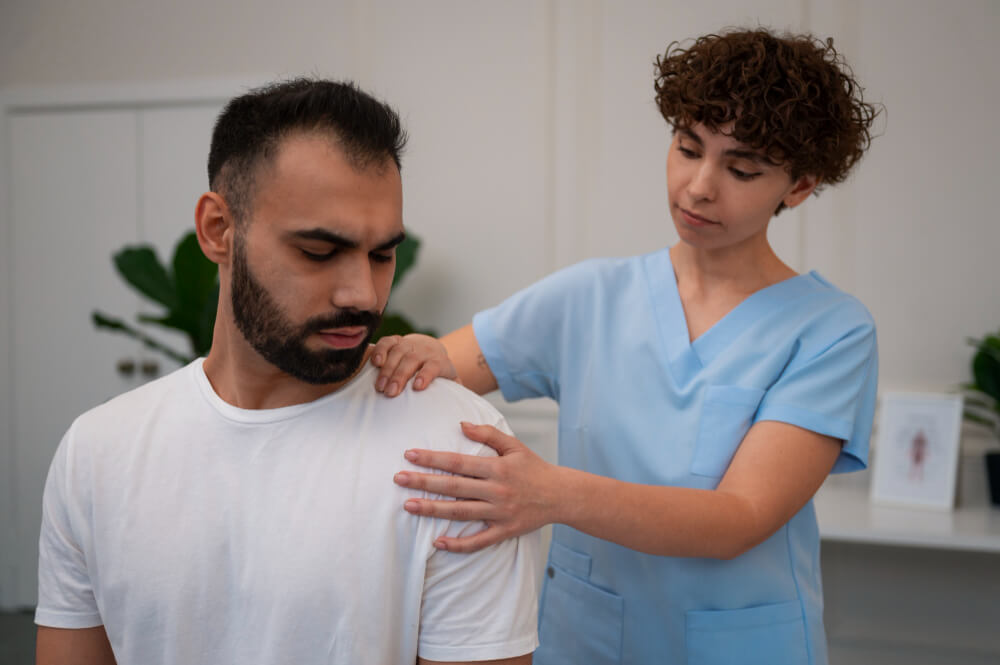Beyond the Game: Sports Medicine and the Road to Recovery from Shoulder Dislocation
The thrill of competition, the pursuit of excellence – the world of sports can be exhilarating. However, pushing the limits of physical performance can sometimes lead to injuries. A dislocated shoulder, a painful experience where the head of the upper arm bone (humerus) pops out of its socket in the shoulder blade (glenoid), can be a common occurrence for athletes in contact sports like football, rugby, or even activities like gymnastics and weightlifting. Fortunately, the field of sports medicine offers a comprehensive approach to address shoulder dislocations, ensuring a smooth and efficient recovery for athletes to return to their sport safely and confidently.

Understanding Sports Medicine: A Specialized Approach to Athletic Care
Sports medicine is a specialized branch of medicine that focuses on the prevention, diagnosis, treatment, and rehabilitation of injuries and conditions affecting athletes of all levels. Sports medicine physicians, also known as sports doctors, are medical professionals who have completed additional training and certification in sports medicine. They possess a deep understanding of the unique demands placed on the human body during athletic activity and the specific injuries athletes are prone to.
The Expertise of Sports Medicine Physicians in Shoulder Dislocations:
Sports medicine physicians have extensive experience in diagnosing and treating shoulder dislocations. Their expertise includes:
- Understanding the Mechanism of Injury: Sports doctors can analyze the cause of the dislocation, considering factors like the type of sport, how the injury occurred, and the athlete’s individual anatomy.
- Comprehensive Evaluation: A thorough physical examination, coupled with imaging tests like X-rays or MRIs, allows for an accurate diagnosis of the dislocation and any associated injuries to ligaments, tendons, or nerves.
- Personalized Treatment Plans: Sports medicine physicians develop individualized treatment plans based on the severity of the dislocation, the athlete’s age and overall health, and their desired level of return to athletic activity.
The Path to Recovery: Treatment Options for Shoulder Dislocation

Following a shoulder dislocation, several treatment options may be employed by a sports medicine physician to facilitate a complete recovery:
- Immobilization: The initial step often involves immobilizing the shoulder in a sling for a period to allow the joint to rest and stabilize.
- Pain Management: Pain medication and anti-inflammatory drugs can help manage discomfort and inflammation during the healing process.
- Physical Therapy: Rehabilitation exercises prescribed by a physical therapist are crucial for regaining strength, flexibility, and range of motion in the shoulder joint.
- Strengthening Exercises: Targeted exercises to strengthen the muscles surrounding the shoulder joint enhance stability and prevent future dislocations.
- Surgical Intervention: In rare cases of severe dislocations with significant ligament damage or instability, surgery might be necessary to repair the joint and restore proper function.
Beyond Treatment: Strategies for Preventing Shoulder Dislocation
While treatment focuses on recovering from a shoulder dislocation, sports medicine physicians also emphasize prevention strategies to minimize the risk of future occurrences:
- Proper Warm-up and Cool-down: Dynamic stretches and warm-up exercises before training and static stretches after training can prepare muscles and joints for activity and reduce injury risk.
- Strengthening Exercises: Regular exercises targeting the shoulder muscles, rotator cuff, and core muscles improve stability and support for the shoulder joint.
- Sport-Specific Training: Sports medicine professionals can recommend training programs specific to the athlete’s sport, focusing on proper technique and movement patterns to reduce the risk of injury.
- Maintaining a Healthy Weight: Excess weight puts additional stress on the shoulder joint. Maintaining a healthy weight can contribute to overall joint health and stability.
